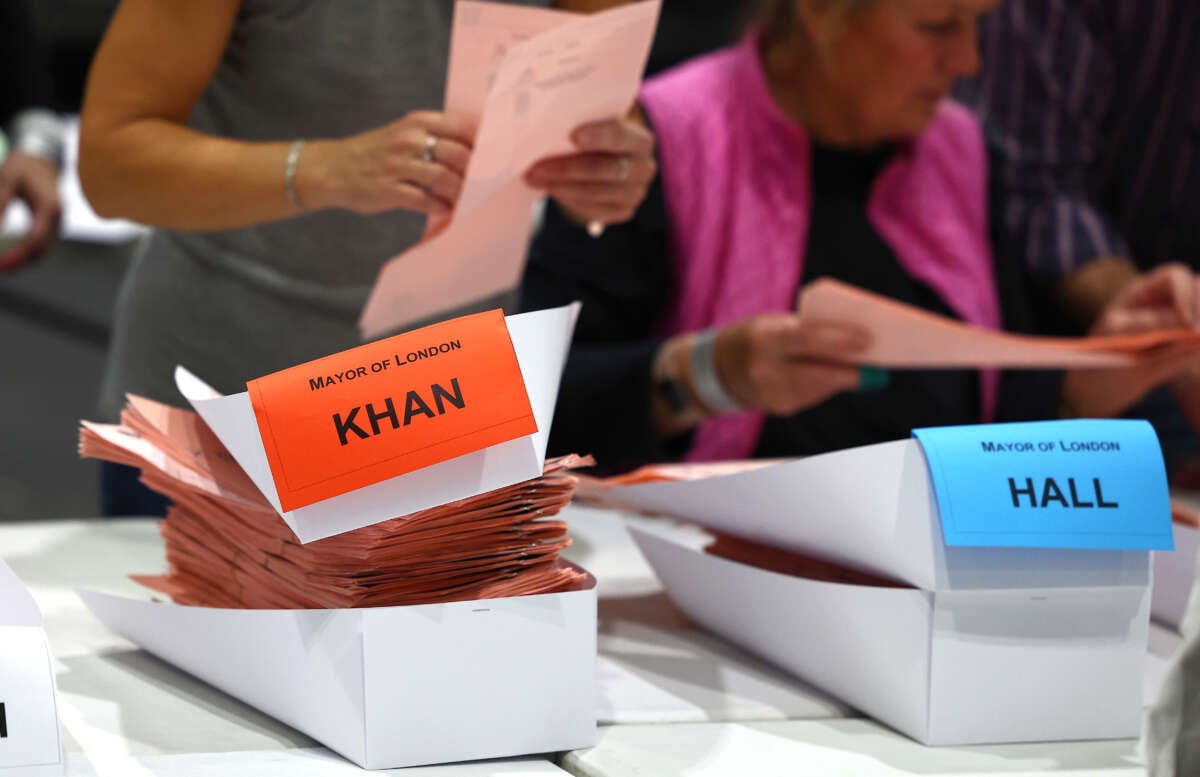Nearly two weeks after the British Conservative Party pushed through a proposal to deport asylum-seekers to Rwanda in what one lawyer called “performative cruelty” in the name of winning the general election expected later this year, the local election results announced throughout the day Friday made increasingly clear the ploy hadn’t worked.
Elections expert John Curtice projected the Tories could ultimately lose up to 500 local council seats as vote counting continues into the weekend, following elections in which voters cast ballots for 2,661 seats.
The Conservatives have lost around half of the seats they are defending Curtice told BBC Radio.
“We are probably looking at certainly one of the worst, if not the worst, Conservative performances in local government elections for the last 40 years,” the polling expert said.
Curtice added that if the results were replicated in a general election, Labour would likely win 34% of the vote, with the Tories winning 25%—five years after the right-wing party won in a landslide in the last nationwide contest.
Labour leader Keir Starmer said the results represented a decisive call for “change” from British voters, particularly applauding the results of a special election in Blackpool South, where Labour candidate Chris Webb won nearly 11,000 votes while Conservative David Jones came in a distant second with just over 3,200.
Webb’s victory represented a 26% swing in favor of Labour.
“That’s the fifth swing of over 20% to the Labour party in by elections in recent months and years. It is a fantastic result, a really first class result,” Starmer said. “And here in Blackpool, a message has been sent directly to the prime minister, because this was a parliamentary vote, to say we’re fed up with your decline, your chaos… your division and we want change. We want to go forward with Labour.”
“That wasn’t just a little message,” he added. “That wasn’t just a murmur. That was a shout from Blackpool. We want to change. And Blackpool speaks for the whole country in saying we’ve had enough now, after 14 years of failure, 14 years of decline.”
The Conservatives also lost ground in the northern town of Hartlepool, where they lost six council seats. The region swung toward the Tories after the party led the push for Brexit, the U.K.’s exit from the European Union.
A similar result was recorded in York and North Yorkshire, which includes the area Conservative Prime Minister Rishi Sunak represented as a member of Parliament.
“Yorkshire voted for Brexit in 2016,” wrote William Booth, London bureau chief for The Washington Post. “But long gone are the days when many Conservatives want to stand before the voters and extol the advantages of leaving the European Union, which has been, in most sectors, a flop.”
Sunak, added Booth, is “betting that immigration is still an issue with resonance and has promised to ‘stop the boats,’ the daily spectacle of desperate migrants risking their lives on rubber rafts trying to cross the English Channel. Sunak’s government plans to fly asylum seekers arriving by boat to Rwanda. No flights have taken off yet. But the Home Office last week began a self-proclaimed ‘large scale’ operation to detain asylum seekers destined for removal.”
The Labour Party has called Sunak’s Rwanda plan a “gimmick” and said it would reverse a Tory policy blocking refugees from applying for asylum.
Average wages in the U.K. last year were “back at the level during the 2008 financial crisis, after taking account of inflation,” according toThe Guardian.
“This 15 years of lost wage growth is estimated by the Resolution Foundation thinktank to have cost the average work £10,700 ($13,426) a year,” reported the newspaper in March. “The performance has been ranked as the worst period for pay growth since the Napoleonic wars ended in 1815.”
Analysts noted one setback for Labour in Oldham, where the party lost some seats in areas with large numbers of Muslim voters to independent candidates, costing it overall control of the council.
Arooj Shah, the Labour leader of the Oldham Council, told the BBC that the party’s support for Israel in its bombardment of Gaza was behind its losses.
“Gaza is clearly an issue for anyone with an ounce of humanity in them, but we’ve asked for an immediate cease-fire right from the start,” said Shah. “We have a rise of independents because people think mainstream parties aren’t the answer.”
The losses “should be a wake-up call for the Starmer leadership: Every vote must be earned,” said the socialist and anti-racist group Momentum. “That means calling for an immediate arms ban to Israel, calling out Israeli war crimes, and delivering real leadership on climate.”
Press freedom is under attack
As Trump cracks down on political speech, independent media is increasingly necessary.
Truthout produces reporting you won’t see in the mainstream: journalism from the frontlines of global conflict, interviews with grassroots movement leaders, high-quality legal analysis and more.
Our work is possible thanks to reader support. Help Truthout catalyze change and social justice — make a tax-deductible monthly or one-time donation today.
